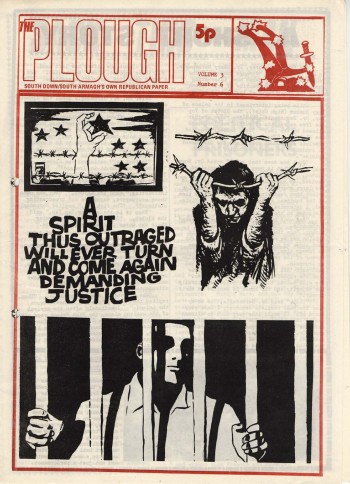Ireland: Background to What Is Happening To-Day

| Date: | 1972 c. |
|---|---|
| Organisation: | Sinn Féin [Official] |
| Type: | Pamphlet |
| View: | View Document |
| Discuss: | Comments on this document |
| Subjects: |
Please note: The Irish Left Archive is provided as a non-commercial historical resource, open to all, and has reproduced this document as an accessible digital reference. Copyright remains with its original authors. If used on other sites, we would appreciate a link back and reference to The Irish Left Archive, in addition to the original creators. For re-publication, commercial, or other uses, please contact the original owners. If documents provided to The Irish Left Archive have been created for or added to other online archives, please inform us so sources can be credited.
Commentary From The Cedar Lounge Revolution
31st January 2022
This document released by Official Sinn Féin offers an overview of the position of the Republican Movement in the very early 1970s. Although not dated it appears to have been published sometime after the introduction of Direct Rule from London.
It is organised in four parts – Part I examines the period 1911-1923, Part 2 1923-1968, Part 3 The Civil Rights Movement 1968 and Part 4 Towards a Solution. There is also an index with descriptions of organisations and historical events.
Some intriguing aspects of the work indicate thinking during this period. For example reference is made to a British ‘federal deal’ to Ireland as a possible outcome of the situation. There’s the following assertion:
Many of the followers of the Civil Rights Movement would consider democracy within the Six Counties where loyalists held two thirds of the votes in any contest as an impossibility. A pamphlet written by Robert Heatley and issued by the Belfast Regional Council of the CRM shortly after the fall of Stormont argues forcefully and validly that only the sub-consciously sectarian could rule out the possibility of a democracy system in the existing conditions of the Six Counties. Yet this is precisely the option adopted by John Hume of the SDLP and the probability is that, because of fifty years experience of Orange rule, a majority of the minority would believe John Hume rather than Civil Rights on the issue.
The split in the Republican Movement into Official and Provisional camps is only dealt with obliquely, though the conclusion argues that:
Those who argue with bomb and bullet for a united Ireland in the present conditions of the North risk a sectarian civil war which will postpone that day indefinitely. They also misunderstand completely the political position of the ruling FF party in the South. FF have become the local managers of British imperialism in the 26 Counties and their political prosperity depends as much on the link with Britain as does that of the Unionist party.
And it concludes:
FF’s main problem is that its pre-Imperialist leadership has a largely republican following. To date, however, it has been able to disguise that fact very effectively and its enemies and rivals in the Republican Movement have failed to create the mass political consciousness of their position. While this consciousness is being fostered in the 26 Counties the most realistic and revolutionary role for Republicans is to gain conditions of democracy in the North which will help eradicate the greatest enemy there – not the British Army, but sectarianism and the division of the working class.
More from Sinn Féin [Official]
Sinn Féin [Official] in the archive




Comments
No Comments yet.
Add a Comment
Comments can be formatted in Markdown format . Use the toolbar to apply the correct syntax to your comment. The basic formats are:
**Bold text**
Bold text
_Italic text_
Italic text
[A link](http://www.example.com)
A link
You can join this discussion on The Cedar Lounge Revolution
By: roddy Tue, 01 Feb 2022 16:08:04
I have to say that if this is from the early 70s,it does not reflect the position of any Official I knew at the time.”Democracy ” in the 6 counties would have been anathema to those who had just experienced internment and Bloody Sunday. Even after the 1972 OIRA ceasefire ,most of its members regarded it as putting the pike in the thatch for a short time,to be retrieved at the most opportune time.Indeed locally and further afield Officials continued to engage the Brits and RUC when they took the notion,ceasefire or not.As the mid and late 70s progressed the vast majority of Officials who were there in the early 70s simply left or defected to others when they saw neo Unionism begin to emerge.
Reply on the CLR
By: WorldbyStorm Tue, 01 Feb 2022 16:26:26
In reply to roddy.
Think I mentioned before a group of former Officials in Derry who went over to PD. They were still bitter about a certain EH coming up and pontificating to them about how the barricades should be taken down and they should make common cause with loyalist groups – as they pointed out, it was the latter at the time who the barricades were up against.
Reply on the CLR
By: banjoagbeanjoe Tue, 01 Feb 2022 18:49:06
In reply to roddy.
Didn’t a lot of Sth Derry OIRA go with the INLA when it was formed c1975?
Reply on the CLR
By: roddy Tue, 01 Feb 2022 19:51:30
In reply to banjoagbeanjoe.
Others including Hughes and McElwee had left circa 74 to go “independent” and then the Provos.
Reply on the CLR
By: WorldbyStorm Tue, 01 Feb 2022 21:54:14
In reply to roddy.
I guess people went in all directions.
Reply on the CLR